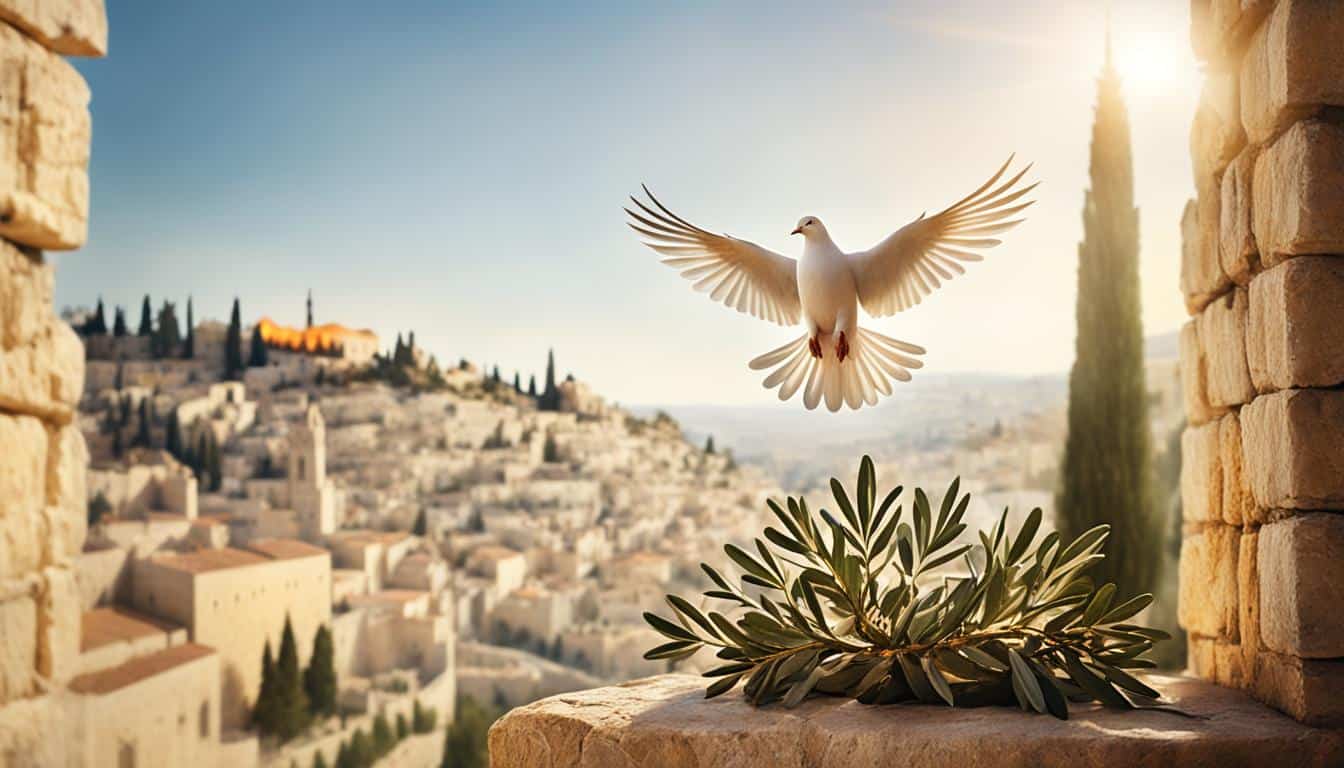Table of Contents
Ever thought about the sacred promises within Jerusalem’s ancient story?
These vows carry spiritual and biblical truths that shape our faith even now. Let’s take an exciting journey to uncover Zion’s Vows and their amazing story.
Zion’s Vows weave a complex tale of faith, hope, and prophecy. From its foundation to the majestic entry, through trials and kingship. Let’s step back in time. We’ll see how these promises define Jerusalem’s story and lead us toward salvation.
Zion’s Foundation and the Cornerstone: How Does Isaiah 28:16 Portray Jesus as Zion’s Foundation?
Isaiah 28:16 gives us a deep look at Jesus as Zion’s cornerstone. It shows Jesus as the base of Jerusalem’s spiritual growth. This verse is key for understanding how Christ supports Zion’s story, both spiritually and historically.
“Therefore thus saith the Lord GOD, Behold, I lay in Zion for a foundation a stone, a tried stone, a precious corner stone, a sure foundation: he that believeth shall not make haste.” – Isaiah 28:16 (KJV)
When we see Jesus as the cornerstone, we get that a cornerstone keeps a building stable. In Zion’s story, Jesus is that key support—strong, unchanging, and reliable.
Like a cornerstone keeps a building up, Jesus supports Zion’s promises. He gives a solid base for the commitments in this holy agreement. His role guarantees that Jerusalem’s story can last through time.
The Apostle Peter calls Jesus the cornerstone in 1 Peter 2:6, showing its importance in Christianity. This link between the Old Testament and New Testament shows God’s ongoing plan. It highlights Jesus’s key role in both Zion’s story and the Church’s foundation.
By seeing Jesus as Zion’s cornerstone, we learn the value of building our faith on Him. Believing in Jesus and His saving actions gives us a stable ground. This belief brings us assurance and fulfills God’s promises.
The Spiritual Significance of Jesus as the Foundation
In Isaiah 28:16, Jesus as the foundation shows His vital role in fulfilling Zion’s promises. Being the cornerstone, Jesus lays the spiritual base for the covenant’s many parts.
- Zion’s Vows: The covenant between God and Jerusalem, encompassing commitments and promises.
- Cornerstone: Jesus, symbolizing stability, dependability, and the foundation of Zion’s narrative.
- Isaiah 28:16: The verse that portrays Jesus as the cornerstone and emphasizes His foundational role in Zion’s Vows.
- Jesus as Foundation: The spiritual significance of Jesus as the unmovable, solid foundation in Zion’s narrative.
Jesus as the foundation brings God’s promises to Zion to life, offering strong hope, redemption, and revival. He’s the rock on which we build our faith and find forever assurance.
The Promise of Eternal Kingship: Understanding Jesus’ Role in Jerusalem through Psalm 2
Psalm 2 introduces a deep insight into Jesus’ role in Jerusalem, linked to Zion’s vows. It reveals the promise of unending kingship, showing Jesus’ divine power as Zion’s eternal King.
“Yet have I set my king upon my holy hill of Zion.” – Psalm 2:6
This verse highlights Jesus’ perpetual rule over Zion’s sacred hill. In this light, we see the importance of Jesus’ position in Jerusalem. He’s the fulfillment of the everlasting kingship promised in Zion’s Vows.
This promise goes beyond the limits of earthly realms. It covers the entire world, offering hope, guidance, and salvation universally.
Psalm 2 also speaks of the challenges Jesus faces:
“Why do the heathen rage, and the people imagine a vain thing?” – Psalm 2:1
This verse shows the pushback Jesus meets from naysayers. Yet, it reminds us that His kingship is firm and unyielding.
Additionally, the psalm showcases the Father’s role in Jesus’ reign and His global dominion:
“Ask of me, and I shall give thee the heathen for thine inheritance, and the uttermost parts of the earth for thy possession.” – Psalm 2:8
This reveals God’s grand plan for Jesus to lead not just Jerusalem but the entire globe. His eternal kingship, as vowed in Zion, underscores His supreme power.
In summary, Psalm 2 highlights the enduring kingship vital to Zion’s Promises. It deepens our grasp of Jesus’ role in Jerusalem, spotlighting His everlasting dominion. Reflecting on this promise, we grasp the vast impact of Jesus’ endless rule.
Zion’s Redemption Through Suffering and Isaiah 53
The story of Jerusalem is deeply tied to the idea of redemption and suffering. This theme is clearly seen in Zion’s Vows and Isaiah 53. These texts show us how suffering leads to redemption.
Isaiah 53 talks about the Messiah’s suffering and redemption. It shows parallels with Jerusalem’s redemption journey. The chapter describes a servant who faces rejection and carries others’ burdens.
He was oppressed, and he was afflicted, yet he opened not his mouth: he is brought as a lamb to the slaughter, and as a sheep before her shearers is dumb, so he openeth not his mouth.
Isaiah 53’s suffering mirrors what Jerusalem went through because of sin. Yet, it also shows hope for redemption. Just like the Messiah overcame suffering, Jerusalem finds restoration in Christ’s redemption work.
This chapter is a stark reminder of suffering in Zion’s story and the redemption that comes. It shows how deep God’s love is and His willingness to redeem His people.
Jesus as the Suffering Servant
In Zion’s Vows, Isaiah 53 highlights Jesus as the fulfillment of the suffering servant. His death on the cross matches the suffering described in Isaiah 53.
Jesus’ sacrifice offers hope and salvation to Jerusalem, fulfilling Zion’s Vows. His sacrifice is key to Zion’s redemption, showing God’s love and grace power.
Implications for Zion’s Vows
Linking Isaiah 53’s suffering and redemption into Zion’s Vows story underscores Christ’s redemptive role. It points out the importance of repentance, forgiveness, and Jerusalem’s restoration.
Reflecting on Isaiah 53 enhances believers’ understanding of Zion’s Vows. It emphasizes the spiritual significance of Jesus’ redemption. It’s a reminder of God’s salvation promise and His eternal covenant.
A Glimpse of Restoration
Isaiah 53 shows not just the Messiah’s suffering but the restoration through redemption. It highlights the hope in Zion’s Vows for reconciliation and victory over sin.
This chapter prophesies Jerusalem’s future redemption and speaks to every believer’s personal redemption. It reminds us of Christ’s suffering and sacrifice power, offering restoration to all who believe.
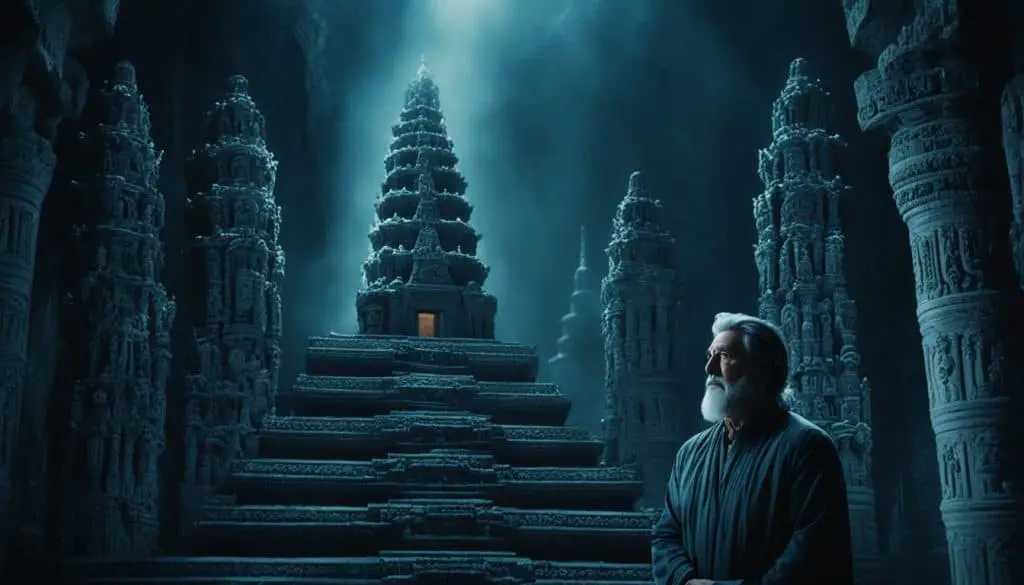
The Gathering of Nations to Zion: Prefiguring Jesus’ Global Mission
In Isaiah 2:2-4, we see a special vision. It shows all nations heading to Zion. This symbolizes Jesus’ mission to the world and is very important for understanding Zion’s Vows.
The prophecy explains how in the future, the Lord’s house will stand above all.
It says, “And it shall come to pass in the last days, that the mountain of the LORD’s house shall be established in the top of the mountains, and shall be exalted above the hills; and all nations shall flow unto it. And many people shall go and say, Come ye, and let us go up to the mountain of the LORD, to the house of the God of Jacob; and he will teach us of his ways, and we will walk in his paths: for out of Zion shall go forth the law, and the word of the LORD from Jerusalem” (Isaiah 2:2-3, KJV).
This prophecy is about everyone being invited to seek wisdom and help from Zion. It shows that Jesus’ mission is for the whole world, not just Israel. Everyone is drawn to God’s promises and truths in Zion’s Vows, much like nations to a mountain.
We also see how Jesus’ work is for everyone, no matter where they come from. He aims to bring everyone together with God. By fulfilling Zion’s Vows, Jesus spreads His kindness all over, making a place where everyone can share in faith and hope.
“And he shall judge among the nations, and shall rebuke many people: and they shall beat their swords into plowshares, and their spears into pruninghooks: nation shall not lift up sword against nation, neither shall they learn war any more” (Isaiah 2:4, KJV).
This prophecy predicts a major change when nations unite in Zion. It speaks of a future with peace instead of conflict. Jesus will guide the nations towards peace and justice. The image of turning swords into farming tools represents the change Jesus’ mission brings, leading to reconciliation and healing.
The Universal Impact of Jesus’ Global Mission
The unification of nations in Zion symbolizes Jesus’ mission’s worldwide effect. It proves that God’s plan of salvation reaches every person. Through His actions and teachings, Jesus offers everyone a chance for a fresh start and invites them to join God’s family and help fulfill Zion’s Vows.
The picture below captures the hope and wide embrace of Jesus’ mission to the world.
| Nations | Prophecies Fulfilled |
|---|---|
| Israel | Matthew 4:15-16 |
| Samaria | Acts 8:5-6 |
| India | Acts 8:26-40 |
| Ethiopia | Acts 8:26-40 |
| Rome | Romans 1:7 |
Jerusalem’s Daughter and the Virgin Birth: Exploring the Connection to Zion’s Story
The story of Zion includes a special prophecy found in Micah 5:2. This prophecy deeply connects to the birth of Jesus, also called Jerusalem’s Daughter.
It shows how the virgin birth fits into the story of Zion. Micah 5:2 says, “But thou, Bethlehem Ephratah, though thou be little among the thousands of Judah, yet out of thee shall he come forth unto me that is to be ruler in Israel; whose goings forth have been from of old, from everlasting.”
This tells us Jesus’ birth was extraordinary, pointing to his eternal nature beyond what we can grasp.
“But thou, Bethlehem Ephratah, though thou be little among the thousands of Judah, yet out of thee shall he come forth unto me that is to be ruler in Israel; whose goings forth have been from of old, from everlasting.” – Micah 5:2
The link between Jerusalem’s Daughter and the virgin birth is tied to old prophecies. These prophecies talked about a Messiah who would save people and start an eternal kingdom. The virgin birth is a miraculous sign, showing Jesus’ divine side and how he fulfills Zion’s promises.
Jesus’ virgin birth brings him into the world as God’s promise to Zion made real. Bethlehem, though small, is where the King of Kings is born. This event connects Jerusalem’s Daughter to Zion’s tale. It marks the start of God’s plan to save all people.
In exploring how Jerusalem’s Daughter and the virgin birth are linked, we see the uniqueness of Jesus’ entrance and his goal to live up to Zion’s promises. The virgin birth proves Jesus is divine, underlining his vital role in Zion’s story and mankind’s salvation.
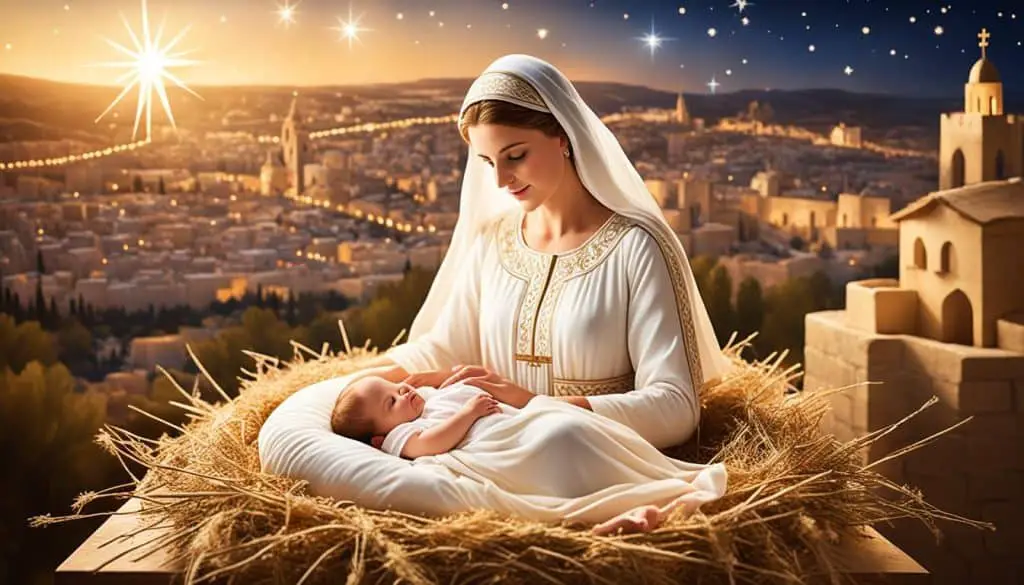
| Connection | Significance |
|---|---|
| Judaic prophecies | Foretold the birth of a ruler in Israel from Bethlehem |
| Divine nature | Emphasized by the miraculous virgin birth |
| Zion’s Vows | Fulfilled in the arrival of Jerusalem’s Daughter |
| Redemptive plan | Beginning of God’s salvation for all humanity |
The Triumphal Entry: Fulfillment of Zechariah 9:9 by Jesus in Jerusalem
We’re diving deeper into Zion’s Vows, reaching a crucial event. We talk about Jesus’ triumphal entry into Jerusalem. This moment was not just a part of his ministry. It also fulfilled Zechariah’s prophecy in Zechariah 9:9.
That day, the crowd saw Jesus as the Messiah. He entered Jerusalem on a donkey, just like the prophecy said. People cheered, laying down their cloaks and palm branches. This showed Jesus as the true King of Israel.
“Rejoice greatly, O daughter of Zion; shout, O daughter of Jerusalem: behold, thy King cometh unto thee: he is just, and having salvation; lowly, and riding upon an ass, and upon a colt the foal of an ass.” – Zechariah 9:9
Jesus entering Jerusalem this way showed something special. It proved he was the Messiah, promised in Zion’s Vows. It was a big sign that biblical prophecies and real-life events matched perfectly.
By choosing a donkey for his entrance, Jesus showed his mission’s humble nature. He aimed to bring hope and forgiveness to everyone who believed in him.
This entry didn’t just fulfill a prophecy. It also started Jesus’ journey to the cross. It showed what was coming—his death and resurrection. These were the final steps in God’s redemption plan for us.
Jesus’ entrance into Jerusalem was a big deal. It showed prophecy coming true. It also underscored God’s constant care for us, highlighting Jesus’ significant role and mission.
Key Takeaways:
- The triumphal entry of Jesus fulfilled the prophecy in Zechariah 9:9, demonstrating the alignment between biblical promises and actual events.
- Jesus’ humble arrival on a donkey symbolized his commitment to the purpose and promises of Zion’s Vows.
- This moment marked the beginning of Jesus’ final journey toward the cross, leading to the ultimate fulfillment of Zion’s Vows through his sacrificial death and resurrection.
We’re going further into Zion’s Vows next. We’ll explore how Jesus connects deeply with Jerusalem. We aim to fully grasp the spiritual and biblical importance of this story.
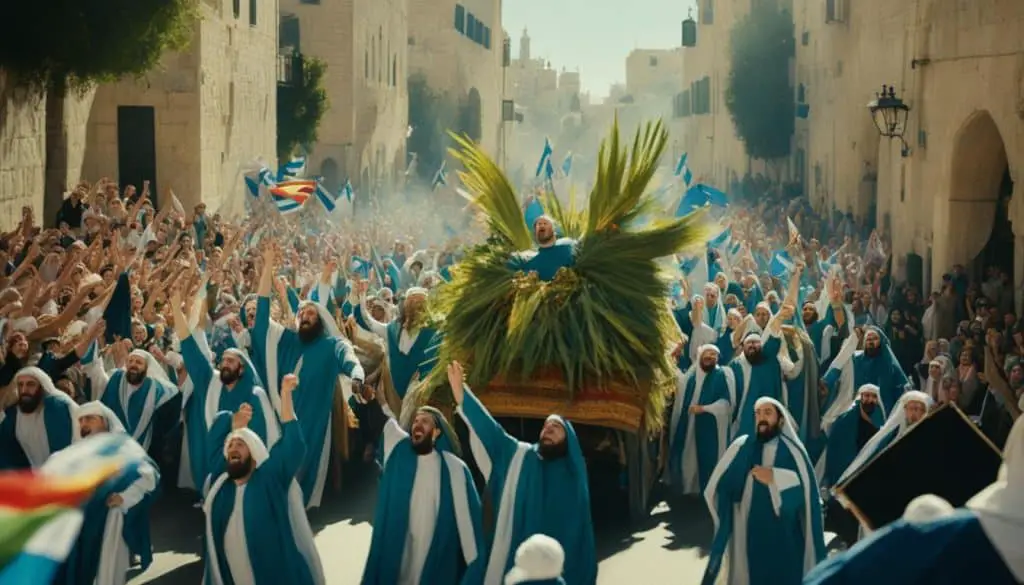
Living Waters from Jerusalem: Jesus’ Promise in Light of Zechariah 14:8
The idea of living waters is a key theme in Zion’s Vows. It’s mentioned in Zechariah 14:8. This prophecy talks about a time when living waters will flow from Jerusalem. This will bring life and new beginnings to the land. Jesus’ promise in John 7 connects deeply with this idea.
Zechariah 14:8 says, “And it shall be in that day, that living waters shall go out from Jerusalem; half of them toward the former sea, and half of them toward the hinder sea: in summer and in winter shall it be.”
These living waters symbolize a great spiritual bounty coming from Jerusalem. They represent the eternal life, cleansing, and spiritual refreshment Jesus offers us.
In the New Testament, Jesus links these waters to himself. He fulfills Zechariah’s words. In John 7:37-38, Jesus says, “If any man thirst, let him come unto me, and drink. He that believeth on me, as the scripture hath said, out of his belly shall flow rivers of living water.“
Jesus is saying he’s the one Zechariah talked about. He calls everyone seeking spiritual fulfillment and eternal life. He promises to fill our deepest needs and give abundant living water.
The living water Jesus offers stands for the Holy Spirit. The Spirit brings spiritual cleansing, growth, and change to believers. Just like the living waters bring life to the land, Jesus brings a full life and spiritual renewal to believers.
“If any man thirst, let him come unto me, and drink. He that believeth on me, as the scripture hath said, out of his belly shall flow rivers of living water.” – John 7:37-38
The link between Zechariah 14:8 and Jesus’ promise in John 7 shows a deep spiritual connection. It highlights Jesus as the source of rich life and spiritual renewal. He invites all to experience the living waters coming from Him.

Jerusalem, the City of the Great King: Understanding Christ’s Relationship with Zion
Let’s dive into the connection between Christ and Jerusalem, known as the city of the great king. This term is used by Jesus in Matthew 5:35. It shows Jerusalem’s special role and power in Zion’s Vows.
Jerusalem stands as both the spiritual and political heart of Israel. God chose it as His dwelling place. The city’s rich biblical history underlines its role in God’s plan to save the world.
“But I say unto you, Swear not at all; neither by heaven; for it is God’s throne: Nor by the earth; for it is his footstool: neither by Jerusalem; for it is the city of the great King.” – Matthew 5:35
Jesus talks about Jerusalem’s holy status in this scripture. He connects it and Zion’s Vows with God’s rule and promises. This shows its central role in God’s plan.
Christ’s bond with Zion stands out in many ways. He fulfills Zion’s Vows and shows us God’s love and mercy.
His life, teachings, and sacrifice bring Zion’s promises to life. Jesus is the rock that God’s kingdom is built on. He brings people back to God.
Jesus’ tie to Zion isn’t just historical; it’s built on love, grace, and divine intent.
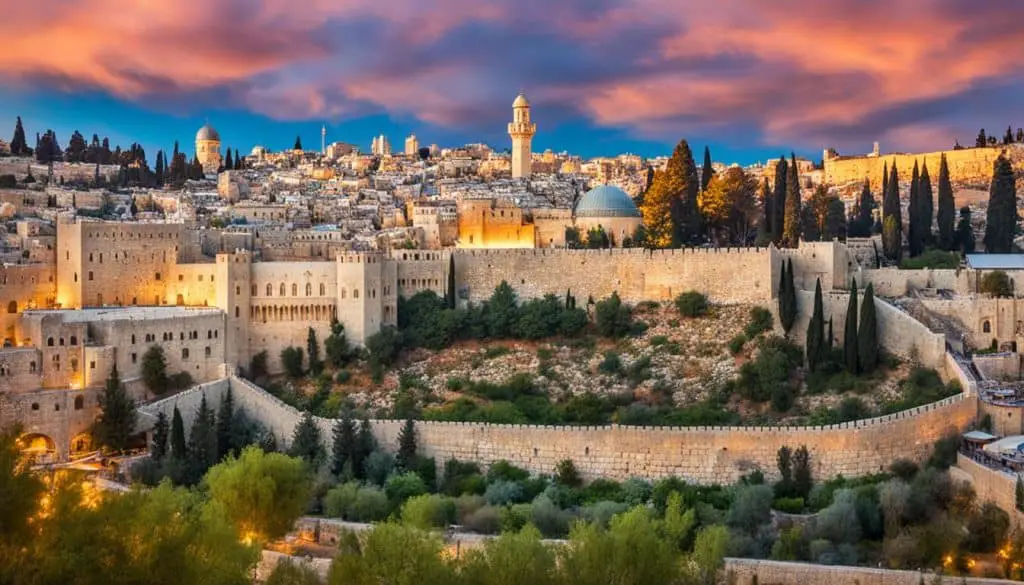
This image gives us a glimpse of Jerusalem’s majesty. It symbolizes the deep bond between Christ and Zion. It also showcases Jerusalem as crucial to understanding Zion’s Vows.
We’ll dig deeper into how Christ’s role in Zion impacts Jerusalem. This will give us more insight into how Jerusalem fulfills God’s promises through Jesus.
The New Jerusalem: A Vision of Zion’s Renewal and Jesus’ Role in Revelation
In the book of Revelation, we see a stunning vision. It’s about the new Jerusalem, coming down from heaven, as said in Revelation 21:2-3. This city is a symbol of God’s promises being fulfilled. It gives believers hope that Jesus is key to Zion’s renewal.
Revelation 21:2-3 shows us a city ready like a bride for her husband, the new Jerusalem. This tells us about the close bond between Christ and His people.
It shows Jesus and the redeemed in eternal unity. The new Jerusalem shines as a sign of God’s loyalty. It marks the healing and uniting of all creation through Jesus.
Thinking about the new Jerusalem reminds us of Jesus’ victory. Revelation 20:9 talks about His win, ruling over everything. With the new Jerusalem as His home, Jesus starts His forever kingdom.
Here, there’s no more pain or death. Jesus, by dying and rising again, brings a hopeful future for believers.
In the end, the new Jerusalem vision in Revelation 21:2-3 tells us a lot about Jesus’ mission. It shows His love, dedication, and win over sin. We, as believers, look forward to living there with Christ forever.

